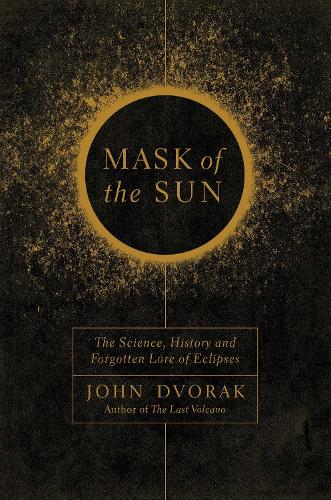
Mask of the Sun: The Science, History and Forgotten Lore of Eclipses
(Paperback)
Publishing Details
Mask of the Sun: The Science, History and Forgotten Lore of Eclipses
By (Author) John Dvorak
Pegasus Books
Pegasus Books
10th April 2018
United States
Classifications
General
Non Fiction
Cosmology and the universe
History of science
Space science
523.78
Physical Properties
Paperback
336
Width 142mm, Height 224mm, Spine 23mm
318g
Description
What do Emily Dickinson, slave revolts, Babylonian Kings, and Monticello all have in common A solar eclipse. Whether it was deciding on the location of a grand home (or castle), inspiring poetry, timing battles and revolts, or planning expeditions, eclipses have inspired fear and fascination. Solar eclipses allowed Ptolemy to determine the length of the Mediterranean and helped Einstein establish his General Theory of Relativity. Preliterate societies recorded eclipses on turtle shells found in "The Wastes of Yin" and on the Mayan "Dresden Codex." Eclipses were later instrumental in the creation of longitude and allowed Hubble to understand the expansion of the Universe (and disprove another theory of Einstein's in the process). John Dvorak, the acclaimed author of Earthquake Storms and The Last Volcano, examines this amazing phenomena and reveals the humanism behind the science. With insightful detail and vividly accessible prose, he provides explanations as to how and why eclipses occuras well as insight into the eclipse of 2017, which was visible across North America.
Reviews
For a more expansive look at how eclipses have been mythologized throughout history, turn to Mask of the Sun. John Dvorak offers useful, engaging background, as well as a deeper understanding of what to expect this August. -- New York Times
A rich chronicle.
-- Nature
Dvoraks meticulously researched book covers the history of human reactions and interpretations from Homer to the Bible and beyond. He doesnt skimp on the science, either; Mask of the Sun is a well rounded, entertaining, and authoritative survey. -- Omnivoracious
If a simple alignment of astronomical bodies can move a 21st-century scientist to tears its perhaps not surprising that eclipses of the sun and moon have haunted the human imagination since our species first looked up at the sky. Mask of the Sun charts the history of this obsession through dozens of stories and anecdotes that illustrate how deeply embedded eclipse lore is in cultures across the world. -- The Spectator (UK)
This book provides an excellent overview of how eclipses work and how people have interpreted them through time. Dvorak explains complex scientific ideas succinctly and clearly without resorting to formula or jargon. Furthermore, he does an excellent job of conveying the wonder of eclipses, describing both their historical-cultural value and the inspirational effect they have on people. A splendid introduction to all aspects of eclipses; for all readers interested in science. -- Library Journal (starred)
Author Bio
John Dvorak, PhD, has studied volcanoes and earthquakes around the world for the United States Geological Survey, first at Mount St. Helens in 1980, then a series of assignments in Hawaii, Italy, Indonesia, Central America and Alaska. In addition to dozens of papers published in scientific journals, Dvorak has written cover stories for Scientific American, Astronomy and Physics Today.
